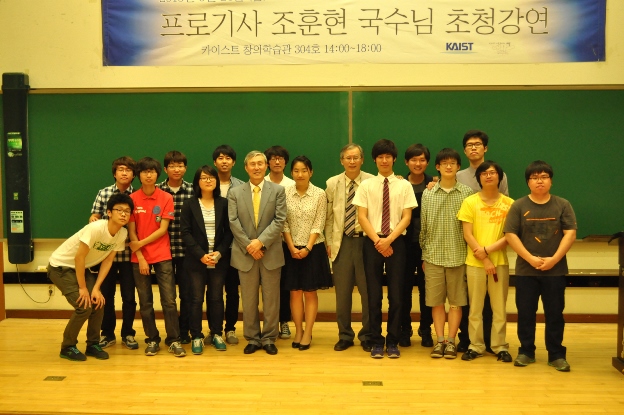To find out about the baduk (Korean chess) lecture provided by Hoon-hyun Cho, Korea’s professional baduk player, The KAIST Herald interviewed Dong-ok Kim, the president of KAIST baduk club Maek, who put a lot of effort into hosting the event at KAIST to raise student awareness and interest in the historical game.
Could you please describe your relationship with Maek and briefly introduce the club?
I joined Maek in 2010. It was more of a coincidence as I followed a friend of mine to the club and started to learn baduk since then. I am the president of Maek now. Maek has about twenty members who have gathered together to play, and we are constantly learning from each other beyond sharing the interest of playing baduk. Interestingly, most of our members are from the mathematics and physics departments. I believe that this has some relation to baduk being a subject of intellectual study; it is more than just a game. Maek was established in 1987, and was officially recognized as a club in 2005.

Taking into account the fact that baduk is a way of having a conversation using hands (su-dam in Korean), it seems that playing baduk is not only about winning the game. How do you go about playing?
When we play the game, we indulge in the game itself: the baduk stones and the laid out situation at every moment. Though we are rivals competing to be the best, we aim for cooperation and symbiosis. The game cannot proceed harmoniously without balance, so we try to keep homeostasis throughout the game. We learn to respect each other because taking a step back and learning to yield at certain times are crucial in proceeding in the game. After all, the game cannot be completed without an opposing player, so we always try our best to work harmoniously.
What made you invite guksu (which means professional baduk player) Hoon-hyun Cho to KAIST?
As Maek gained stability as a club, we thought of inviting Cho to KAIST to gain a better understanding of baduk and meet an exceptional expert in the field. In this process, we also invited Hajin Lee, a professional baduk player who has been supporting Maek since 2010 and participating in baduk events held every semester. All members of Maek were excited to hold the event, as it is an honor for amateurs to meet professional baduk players, and prepared for this day quite systematically. Though not everything was perfect, I am glad that we put the event together. Meeting Cho and his lifelong student Chang-ho Lee, who also paid a visit, was a great opportunity for members of Maek and other KAIST students as well.
Cho emphasized the importance of living every moment passionately as if playing a round of baduk. How did you understand this message? What have you learned from the lecture?
I see the baduk stones as pieces that affect the overall outcome of life. Sometimes, the stones that die seem utterly meaningless, but these stones actually contribute to the success of your game in the end. Putting passion and delicate respect into each go stone is thus a meaningful process of playing baduk, and I see it as a way of living a fierce yet respectful way of life. From the lecture, I realized that learning comes from the very idea of learning itself. No one teaches you anything; you just learn. It is similar to building your own character with clues that you find from playing baduk. If not anything, I now see life as a way of preparing for death, like waiting for a round of baduk to come to an end; I want to wrap my life nicely for a beautiful ending.
Why do you think that baduk is losing popularity among other games, yet still maintains to exist? How do you plan on contributing to keep its stance?
The main reason for losing popularity is that baduk is hard to learn. A semester-long leadership course is not enough for students to obtain well-established baduk playing skills. However, the value of playing baduk lies in its 4000-year-old history. It certainly cannot be compared with other games that come and go as time passes. Baduk is also unique in that it is not a programmed game; there are only a few rules to keep by and there are many different outcomes that are beyond imagination. As a fan of baduk, I shall try to promulgate it as much as possible, which is why Maek scheduled a meeting with Cho for KAIST students who may find themselves interested in baduk.

